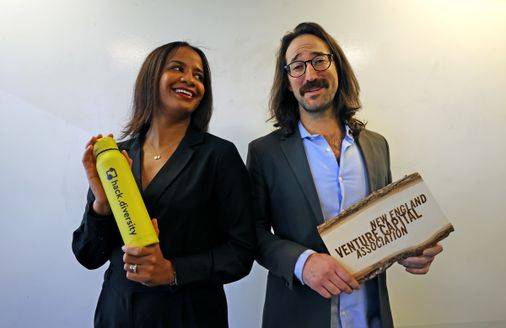Rose and Bussgang didn’t have a playbook for fixing Boston tech’s diversity problems, but they set out to help more Black and Latinx candidates get technology jobs in the city’s innovation companies.
That year, they started a program through NEVCA, the trade association of Boston’s venture capital community, called Hack.Diversity, which offers people of color fellowships with local tech companies.
Six years later, Hack.Diversity has grown so rapidly that it has now been spun out of NEVCA into a separate nonprofit. In its first year, Hack.Diversity placed 16 fellows at five companies for nine months. This year, the program has 130 fellows at nearly 30 companies, including local tech giants Wayfair, Rapid7, and Toast.
Last month, Rose stepped down from NEVCA to serve as the president of Hack.Diversity, and she plans to expand the organization’s model across the country. It’s a major move for someone who almost didn’t take Bussgang’s advice.
As a Black woman who had just taken the helm of the trade group that represents Boston startups and VCs, she didn’t want her first priority to be addressing the industry’s failure to hire more people of color.
“I was afraid that I was going to be labeled as that Black woman that was going to come in and only know how to focus on diversity,” Rose said.
But she was acutely aware that if she didn’t do something, underrepresented communities would continue to be overlooked and marginalized.
“I know firsthand what it feels like,” Rose said. “Part of my mission was, how do we change the narrative of what it means to build a career in Boston as a person of color?”

Hack.Diversity helps companies find potential job candidates who often slip through their recruitment cracks, such as those who attend two-year colleges, state schools, and coding boot camps. Companies pay to participate, and that money supports about 70 percent of the program’s cost.
“We said from the very beginning, this is not charity,” Bussgang said. “This is a strategic talent initiative… Companies pay because they get value out of it.”
Hack.Diversity also provides feedback to help firms understand whether they are creating an equitable environment. Some have since altered the wording of job descriptions, removed a bachelor’s degree requirement, or made their interview process more inclusive, Rose said.
Rose points to the program’s unique model, which requires accountability on the part of participating companies, as well as the high rate at which students end up getting hired after their fellowship. Since its inception, Hack.Diversity has helped 250 Black and Latinx fellows get hired as software engineers, data analysts, or IT professionals, a number expected to grow to nearly 400 by the end of the year.
It helps that over the past two years, companies have become more serious about their diversity efforts.
“George Floyd is murdered, and the demand was through the roof,” Rose said. “Companies who we weren’t working with were like, ‘Can we work with you?’ Since then, we have had a waiting list of companies.”
Under Rose’s leadership the NEVCA has also experienced a major period of growth, doubling its number of member companies to 80 since 2017.
Now that Hack.Diversity is a nonprofit, it can raise money to fund its own expansion. (Previously, it operated on the balance sheet of NEVCA and could only raise money through the organization’s partnership with the Boston Foundation.) About 12 NEVCA employees will transition to the nonprofit, leaving three at NEVCA.
Ari Glantz, who started working at NEVCA a few months before Rose, is the organization’s new executive director. Rose will remain involved, as Hack.Diversity will operate as the trade association’s philanthropic arm, located in the same office at 50 Milk St. in Boston.
Although she is proud of the impact Hack.Diversity has had on Boston, Rose said she knows “this is a long game.”
“This is not a challenge that you apply a fix and wait for there to be a major change over the next year or two years,” she said. “There’s still a lot of work to do.”
Anissa Gardizy can be reached at anissa.gardizy@globe.com. Follow her on Twitter @anissagardizy8 and on Instagram @anissagardizy.journalism.
Credit: Source link


Comments are closed.